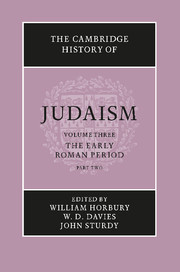Book contents
- Frontmatter
- 1 The archaeology of Palestine 63 bce–ce 70
- 2 The Herodian Temple
- 3 Recent archaeology in Palestine: achievements and future goals
- 4 The contribution of Jewish inscriptions to the study of Judaism
- 5 The social, economic and political history of Palestine 63 bce–ce 70
- 6 The Diaspora in the Roman period before ce 70
- 7 The Gentiles in Judaism 125 bce–ce 66
- 8 Gentiles as seen by Jews after ce 70
- 9 The synagogue
- 10 The Temple and the synagogue
- 11 The early liturgy of the synagogue
- 12 Women in the synagogue
- 13 The Pharisees
- 14 The Sadducees – their history and doctrines
- 15 The Essenes
- 16 The baptist sects
- 17 The troublemakers
- 18 The Samaritans and their sects
- 19 Galilean Judaism and Judaean Judaism
- 20 Jesus: from the Jewish point of view
- 21 Paul: from the Jewish point of view
- 22 Jewish Christianity
- 23 Apocalyptic: the disclosure of heavenly knowledge
- 24 The Qumran sectarian writings
- 25 The Dead Sea Scrolls and pre-Tannaitic Judaism
- 26 Prayer in the Qumran Texts
- 27 Philo of Alexandria
- 28 Josephus (ce 37–c. 100)
- 29 The rabbi in second-century Jewish society
- 30 The Hellenistic–Roman Diaspora ce 70–ce 235: the archaeological evidence
- 31 The legacy of Egypt in Judaism
- 32 Jewish elements in gnosticism and magic c.ce 70–c.ce 270
- Bibliographies
- Index
- References
6 - The Diaspora in the Roman period before ce 70
Published online by Cambridge University Press: 28 March 2008
- Frontmatter
- 1 The archaeology of Palestine 63 bce–ce 70
- 2 The Herodian Temple
- 3 Recent archaeology in Palestine: achievements and future goals
- 4 The contribution of Jewish inscriptions to the study of Judaism
- 5 The social, economic and political history of Palestine 63 bce–ce 70
- 6 The Diaspora in the Roman period before ce 70
- 7 The Gentiles in Judaism 125 bce–ce 66
- 8 Gentiles as seen by Jews after ce 70
- 9 The synagogue
- 10 The Temple and the synagogue
- 11 The early liturgy of the synagogue
- 12 Women in the synagogue
- 13 The Pharisees
- 14 The Sadducees – their history and doctrines
- 15 The Essenes
- 16 The baptist sects
- 17 The troublemakers
- 18 The Samaritans and their sects
- 19 Galilean Judaism and Judaean Judaism
- 20 Jesus: from the Jewish point of view
- 21 Paul: from the Jewish point of view
- 22 Jewish Christianity
- 23 Apocalyptic: the disclosure of heavenly knowledge
- 24 The Qumran sectarian writings
- 25 The Dead Sea Scrolls and pre-Tannaitic Judaism
- 26 Prayer in the Qumran Texts
- 27 Philo of Alexandria
- 28 Josephus (ce 37–c. 100)
- 29 The rabbi in second-century Jewish society
- 30 The Hellenistic–Roman Diaspora ce 70–ce 235: the archaeological evidence
- 31 The legacy of Egypt in Judaism
- 32 Jewish elements in gnosticism and magic c.ce 70–c.ce 270
- Bibliographies
- Index
- References
Summary
Rome's acquisition of a territorial empire in the eastern Mediterranean between the mid second and the mid first century bce put all the numerous Diaspora communities of Greece, the Aegean islands, Crete, Cyprus, Asia Minor, Syria, and Cyrenaica under her rule. The annexation of Egypt in 30 bce, closing the only gap in the ring of provinces bordering the Mediterranean, brought into the empire what was probably the largest of all Diaspora communities at the time, that of Alexandria, as well as many smaller Jewish settlements up-country in Egypt. In the west the Jewish community in Rome, apparently dating back at least to the mid second century, was dramatically enlarged in 62 bce when Pompey returned from eastern campaigns which had included the capture of Jerusalem with thousands of Jewish prisoners-of-war, who were sold into slavery after walking in his triumphal procession and later, on regaining their freedom by manumission, settled permanently in the city.
With the annexation of the province of Judaea in ce 6, all Jews except the Babylonian Diaspora were under Roman rule. The pax Romana and the improvements in communications which followed the expansion of Roman power throughout the Mediterranean world facilitated movement and the development of Diaspora communities in Italy and the western provinces. No date or origin can be assigned to the numerous settlements eventually known in the west, and some may have been founded as a result of the dispersal of Palestinian Jews after the revolts of ce 66–70 and 132–5, but it is reasonable to conjecture that many, such as the settlement in Puteoli attested in 4 bce, went back to the late republic or early empire and originated in voluntary emigration and the lure of trade and commerce.
- Type
- Chapter
- Information
- The Cambridge History of Judaism , pp. 168 - 191Publisher: Cambridge University PressPrint publication year: 1999
References
- 4
- Cited by

